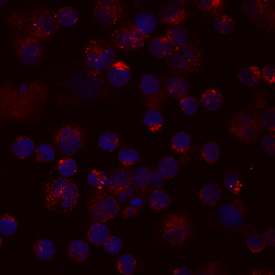Human CCL4/MIP-1 beta Biotinylated Antibody Summary
Applications
Human CCL4/MIP-1 beta Sandwich Immunoassay
Please Note: Optimal dilutions should be determined by each laboratory for each application. General Protocols are available in the Technical Information section on our website.
Scientific Data
 View Larger
View Larger
CCL4/MIP‑1 beta in Human PBMCs. CCL4/MIP‑1 beta was detected in immersion fixed human peripheral blood mononuclear cells (PBMCs) using Human CCL4/MIP‑1 beta Biotinylated Antigen Affinity-purified Polyclonal Antibody (Catalog # BAF271) at 10 µg/mL for 3 hours at room temperature. Cells were stained using the NorthernLights™ 557-conjugated Streptavidin (red; Catalog # NL999) and counterstained with DAPI (blue). View our protocol for Fluorescent ICC Staining of Non-adherent Cells.
Reconstitution Calculator
Preparation and Storage
- 12 months from date of receipt, -20 to -70 degreesC as supplied. 1 month, 2 to 8 degreesC under sterile conditions after reconstitution. 6 months, -20 to -70 degreesC under sterile conditions after reconstitution.
Background: CCL4/MIP-1 beta
CCL4, also known as macrophage inflammatory protein 1 beta (MIP-1 beta ) is a 7.8 kDa beta chemokine that is secreted at sites of inflammation by activated leukocytes, lymphocytes, vascular endothelial cells, and pulmonary smooth muscle cells. CCL4 attracts a variety of immune cells to sites of microbial infection as well as to other pathologic inflammation such as allergic asthma and ischemic myocardium. A CCL4 deficiency in mice promotes the development of autoantibodies, possibly as a result of compromised regulatory T cell recruitment. CCL4 is secreted from activated monocytes as a heterodimer with CCL3/MIP-1 alpha. The first two N-terminal amino acids can be cleaved from human CCL4 by CD26/DPPIV. Both the full length and truncated forms exert biological activity through CCR5, and the truncated form additionally interacts with CCR1 and CCR2b. In humans, the ability of CCL4 to bind CCR5 inhibits the cellular entry of M-tropic HIV-1 which utilizes CCR5 as a coreceptor. Both forms of CCL4 block HIV-1 infection of T cells by inducing the downregulation of CCR5. Mature human CCL4 shares 77% and 80% aa sequence identity with mouse and rat CCL4, respectively.
Product Datasheets
Citations for Human CCL4/MIP-1 beta Biotinylated Antibody
R&D Systems personnel manually curate a database that contains references using R&D Systems products. The data collected includes not only links to publications in PubMed, but also provides information about sample types, species, and experimental conditions.
8
Citations: Showing 1 - 8
Filter your results:
Filter by:
-
Human NK cells adapt their immune response towards increasing multiplicities of infection of Aspergillus fumigatus
Authors: L Marischen, A Englert, AL Schmitt, H Einsele, J Loeffler
BMC Immunol., 2018-12-18;19(1):39.
Species: Human
Sample Types: Cell Culture Supernates
Applications: Western Blot -
Noninvasive detection of acute and chronic injuries in human renal transplant by elevation of multiple cytokines/chemokines in urine.
Authors: Hu H, Kwun J, Aizenstein BD, Knechtle SJ
Transplantation, 2009-06-27;87(12):1814-20.
Species: Human
Sample Types: Urine
Applications: Antibody Array Development -
Relation of circulating concentrations of chemokine receptor CCR5 ligands to C-peptide, proinsulin and HbA1c and disease progression in type 1 diabetes.
Authors: Pfleger C, Kaas A, Hansen L, Alizadeh B, Hougaard P, Holl R, Kolb H, Roep BO, Mortensen HB, Schloot NC
Clin. Immunol., 2008-04-22;128(1):57-65.
Species: Human
Sample Types: Serum
Applications: ELISA Development -
Upregulation of human cytomegalovirus by HIV type 1 in human lymphoid tissue ex vivo.
Authors: Biancotto A, Iglehart SJ, Lisco A, Vanpouille C, Grivel JC, Lurain NS, Reichelderfer PS, Margolis LB
AIDS Res. Hum. Retroviruses, 2008-03-01;24(3):453-62.
Species: Human
Sample Types: Cell Culture Supernates
Applications: Luminex Development -
Abnormal activation and cytokine spectra in lymph nodes of people chronically infected with HIV-1.
Authors: Biancotto A, Grivel JC, Iglehart SJ, Vanpouille C, Lisco A, Sieg SF, Debernardo R, Garate K, Rodriguez B, Margolis LB, Lederman MM
Blood, 2007-02-08;109(10):4272-9.
Species: Human
Sample Types: Cell Culture Supernates
Applications: Luminex Development -
Increased expression of Th2-associated chemokines in bullous pemphigoid disease. Role of eosinophils in the production and release of these chemokines.
Authors: Gounni Abdelilah S, Wellemans V, Agouli M, Guenounou M, Hamid Q, Beck LA, Lamkhioued B
Clin. Immunol., 2006-06-16;120(2):220-31.
Species: Human
Sample Types: Cell Culture Supernates
Applications: ELISA Development -
Changes in soluble factor-mediated CD8+ cell-derived antiviral activity in cynomolgus macaques infected with simian immunodeficiency virus SIVmac251: relationship to biological markers of progression.
Authors: Dioszeghy V, Benlhassan-Chahour K, Delache B, Dereuddre-Bosquet N, Aubenque C, Gras G, Le Grand R, Vaslin B
J. Virol., 2006-01-01;80(1):236-45.
Species: Primate - Macaca fascicularis (Crab-eating Monkey or Cynomolgus Macaque)
Sample Types: Cell Culture Supernates
Applications: ELISA Development -
Fractalkine reduces N-methyl-d-aspartate-induced calcium flux and apoptosis in human neurons through extracellular signal-regulated kinase activation.
Authors: Deiva K, Geeraerts T, Salim H, Leclerc P, Hery C, Hugel B, Freyssinet JM, Tardieu M
Eur. J. Neurosci., 2004-12-01;20(12):3222-32.
Species: Human
Sample Types: Whole Cells, Whole Tissue
Applications: ICC, IHC-Fr
FAQs
No product specific FAQs exist for this product, however you may
View all Antibody FAQsReviews for Human CCL4/MIP-1 beta Biotinylated Antibody
There are currently no reviews for this product. Be the first to review Human CCL4/MIP-1 beta Biotinylated Antibody and earn rewards!
Have you used Human CCL4/MIP-1 beta Biotinylated Antibody?
Submit a review and receive an Amazon gift card.
$25/€18/£15/$25CAN/¥75 Yuan/¥2500 Yen for a review with an image
$10/€7/£6/$10 CAD/¥70 Yuan/¥1110 Yen for a review without an image



